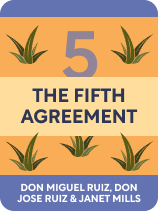

This article is an excerpt from the Shortform book guide to "The Fifth Agreement" by Don Miguel Ruiz. Shortform has the world's best summaries and analyses of books you should be reading.
Like this article? Sign up for a free trial here .
What are the five agreements? How do they change the way you see everything? Where do they lead?
In The Fifth Agreement, authors don Miguel Ruiz and don Jose Ruiz outline the five agreements that you can make with yourself. These agreements transform how you perceive the world and your place in it. The authors believe that, if you practice these principles, you’ll rediscover your true self and reclaim the wholehearted love, joy, and freedom that you enjoyed as a child.
Keep reading for details about the five agreements.
The Five Agreements
We’ve learned that we don’t have to continue to hold the harmful beliefs society has taught us and what our lives can look like when we’re free—now, let’s explore how to shed those beliefs and achieve freedom.
The authors present a five-step process to escape the mirage of “the real world” by reframing your perspective to adjust your reactions to the messages you receive. By practicing the five agreements in your own life, the naguals say, you begin to reconnect with your needs and desires and reclaim the freedom to be satisfied with yourself as you are. In other words, what follows is the Toltec road to enlightenment.
(Shortform note: There are many paths to discarding self-limiting beliefs and reclaiming a feeling of self-worth, and the Toltec road is just one of these. For example, cognitive behavioral therapists specialize in mindset-change—helping clients adjust the way they think about themselves and their day-to-day lives to gradually eliminate self-criticism and shame.)
Let’s look at each of the five agreements in detail.
Agreement 1: Be Impeccable With Your Word
The first step in the Toltec process is to be impeccable with your word. In the mirage of “the real world,” we use words to denigrate, criticize, and attack not just those we dislike, but our friends, our children, and even ourselves.
“Use your words wisely” means don’t weaponize your words against yourself. Don’t describe yourself in hurtful ways, inside your head or aloud—for example, by telling yourself you’re ugly, stupid, or a failure. When you do that, you accept those messages as truth and make those negative beliefs a part of your reality. It’s no wonder you’re not happy when you see yourself that way. Instead, allow yourself to be as you are without judgment—nothing about you is inherently imperfect, even if you’ve been taught to believe otherwise.
(Shortform note: Another important thing to remember is that self-criticism typically doesn’t reflect reality. For example, psychologists note that those who self-criticize often feel that they receive less support from others, that they’re less attractive, and that they’re less happy than others. However, studies show that in most cases, these feelings don’t reflect their reality—instead, the tendency to self-criticize trains us to overestimate the negative aspects of our experience and underestimate the positive.)
Further, let others be as they are, too: Don’t externalize the voice that hurts you. The authors say that when you use your words against others, to spread gossip, criticism, or hurt, you’re not using them wisely. You further the hurt others already feel and push them to conform to the harmful societal beliefs you’re attempting to move away from. Additionally, you invite a future in which that hurt comes back to you as mistreatment. Respect the power your words can have, over others as well as yourself.
(Shortform note: When you use your words to hurt others, you risk starting long-term conflicts. In The Anatomy of Peace, the Arbinger Institute explains that when we provoke, demean, and infuriate others, we motivate them to respond in kind and initiate a cycle of mistreatment. As the cycle continues, we stop seeing them as people, instead seeing them as distasteful objects that can’t be reasoned with. Over time, the conflict festers and grows, dragging in those around us as we grow further and further apart. Do others the courtesy of seeing them as people, with needs, struggles, and hopes of their own—you’ll find it harder to justify using your words and actions to hurt them, and that will keep you out of cyclical conflicts.)
Agreement 2: Don’t Take Anything Personally
The second of the five agreements is to understand that the words and actions of others are based on their own relative perceptions: They’re not actually about you. So, don’t take anything personally.
Why is this the case? Because, as we’ve discussed, we all live in our own private world. We see things differently and we hold our own subjective beliefs. The authors explain that due to this subjectivity, everyone you know has an image of you in their head wholly based on their subjective perception of you and your actions. This image includes assumptions about who you are, what you think, what your life is like, and what you’re good and bad at.
Ultimately, these assumptions can’t possibly reflect the truth of who you are because nobody has a clue what’s going on inside your head.
| People Don’t Know You As Well As You’d Think The naguals say we shouldn’t take it personally if others don’t see us for who we really are because, bluntly, nobody can. In fact, Dr. Heidi Grant Halvorson, author of No One Understands You and What To Do About It explains that we think others know us better than they really do. We assume anyone can tell what we want, what we think, or what we mean—but that’s not the case at all. It’s possible for someone to get close, but it takes so much effort that most people won’t bother. The mental picture others have of us, Dr. Halvorson says, is built by a two-part system of thought. “System one” thinking is automatic, hasty, and reflexive; people engage system one when they see a small slice of us and make a series of snap judgments. In contrast, “system two” requires conscious effort and focused intent; people engage system two when they deliberately put aside their snap judgments and get to know the real you. Often, people don’t use system two at all: Unless they make an intentional effort to be open-minded, they go with their first impulse and leave it at that. Even those who make the effort are still missing a lot—they only see what you show them and they may not eliminate all their assumptions, biases, and filters. Take the perspectives of others with a grain of salt. |
Agreement 3: Don’t Make Assumptions
The third of the five agreements is to accept that you can’t guess what someone else is thinking or what’s going on in their life. This is essentially the previous step in reverse: The naguals explain that your assumptions about another person’s reasoning or behavior aren’t based on what’s really going on with them, but on your (probably false) perception of them. Therefore, when you expect others to behave a certain way, you set yourself up for disappointment. The naguals’ suggestion? To avoid disappointment and be happy socially, stop making these kinds of assumptions.
(Shortform note: In his book Talking to Strangers, Malcolm Gladwell explains that while we think we’re good at reading people, we’re actually terrible at it. We assume people are telling the truth and that the way they present themselves outwardly is an accurate and reliable representation of their inner feelings and intentions. But don’t we all occasionally hide our true feelings, tell half-truths, or mask our intent—and haven’t we gotten away with it? Why should others be any different?)
Agreement 4: Always Do Your Best
The fourth of the five agreements is to always do your best. As you work to challenge and adjust your beliefs and implement the first three steps, the naguals say you’ll inevitably experience missteps and mistakes. Don’t take that to mean you’re not improving. As long as you’re always doing your best, you’ll continue to progress. Growth takes time, the naguals admit, and a mindset shift like this is a big adjustment.
While striving to do your best, the naguals explain that it’s critical to maintain a realistic expectation of what your “best” is: Like everything else in our world, your “best” is relative. In short: Your best is whatever you can do right now. That capacity will change from moment to moment, and day to day.
If you define your “best” as the highest bar you’ve ever achieved and expect that of yourself no matter the circumstances, you set yourself up for failure and disappointment. In contrast, the naguals suggest, when you accept that you’ve done what you can for the day, you have no reason to beat yourself up; self-criticism becomes unnecessary and unreasonable.
| Maintain a Growth Mindset When we don’t succeed, we often punish ourselves—sometimes we spend years beating ourselves up for one mistake. But mistakes happen even when we try our best, the naguals say; they’re a sign that we’re growing. Don’t dwell on them—focus on getting better each day. In Drive, Daniel H. Pink recommends maintaining a growth mindset. He explains that people with a growth mindset believe they have the potential to get better at anything they want to do. As a result, they see effort as the driver of improvement, focus on progress over results, and examine their failures for useful feedback. He points out that it’s not possible to achieve total, effortless mastery, no matter the skill. There’s always more to learn and new situations to apply your knowledge to, and improving isn’t easy. As you practice changing the way you see your world, keep in mind that judgment and self-criticism are deeply ingrained habits. Changing your thinking is difficult, and it won’t happen overnight—so just do what you can each day. Take pride in incremental progress; improvement is success. Your capacity isn’t static: If you couldn’t succeed today, don’t take that to mean you never will! |
Agreement 5: Be Skeptical but Learn to Listen
Once you arrive at the fifth step, you’re ready to move to the third stage of Toltec enlightenment—the freedom of control. In other words, since you’re no longer being controlled by beliefs you didn’t choose, it’s up to you to decide how to live. You have the freedom to choose the shape and tone of your subjective reality.
To maintain total freedom, the naguals say, be skeptical, but learn to listen. Doubt and question everything you hear. No matter how well you manage your environment, you’ll still live in a shared world. As such, you’ll often see upsetting or manipulative messages—your culture and society, for example, will still attempt to tell you what to believe, how to feel, and who to be. Social media will still blast you with emotional content. If you blindly take these things at face value, the naguals warn, assuming they’re true, valid, and “real,” you risk being dragged back into the mirage.
(Shortform note: The “doubt” the naguals are promoting is what’s often called “healthy skepticism.” It’s important to note that a skeptic is different from a cynic: While a cynical person leverages doubt to avoid adjusting their worldview, doubting evidence that contradicts their beliefs, a skeptic holds off on making adjustments until they’ve gathered sufficient evidence to determine what’s really true.)
Instead, the naguals recommend you use doubt as a tool to detach yourself from your knee-jerk, automatic response to incoming messages. If you don’t immediately accept an upsetting message as fact, its impact is dulled and slowed, and you have time to think about it before it becomes part of your subjective reality. That ability to detach and delay, emotionally and intellectually, allows you to control what you believe, feel, and think, as well as how you behave, regardless of what’s happening around you. It’s how you maintain the freedom of control.
(Shortform note: Part of doubting what you hear is holding off on deciding whether it’s true or not—or whether you believe or agree with it. In short, you’ll need to embrace uncertainty, which psychologists argue is a healthy practice. Doing so is critical to becoming emotionally stable, and it builds resilience—the ability to adapt to change. That’s part of what the naguals want for you: To be able to face the uncertainty of your social and personal future with bravery and hope.

———End of Preview———
Like what you just read? Read the rest of the world's best book summary and analysis of Don Miguel Ruiz's "The Fifth Agreement" at Shortform .
Here's what you'll find in our full The Fifth Agreement summary :
- The five “agreements” to make with yourself that adjust your outlook
- How to rediscover your true self and recapture the freedom you felt as a child
- A five-step process to escape the mirage of “the real world”






